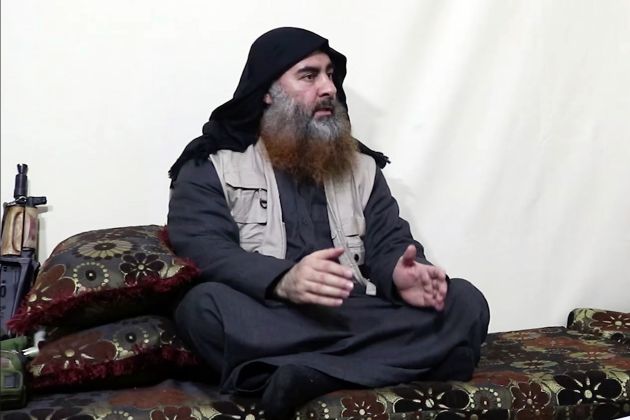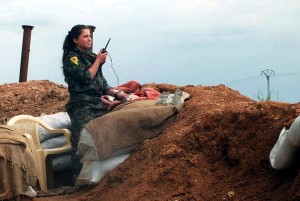By Emile Nakhleh
The demise of Osama bin Ladin in 2011 did not end al-Qaeda. Nor will the apparent demise of Abu Bakr al-Baghdadi end the terror of the Islamic State. Al-Baghdadi’s death is a major psychological blow to the so-called Islamic State (the terror group also known as IS, ISIS, ISIL, or Daesh), but it does not spell the end of global terrorism under its black banner.
The removal of these global terror organizations’ leaders—including Abu Musab al-Zarqawi in 2006, Bin Ladin in 2011, and al-Baghdadi this past Saturday—was a setback to these organizations’ fortunes, but did not cripple their activities. In fact, by the time Bin Ladin and al-Baghdadi faced their ultimate fate, they had already become almost irrelevant to the actual operations of their respective groups.
Terror Leadership
The biggest quandary facing Western countries and their intelligence services has always been the leadership succession of terrorist organizations. It’s much easier to track the leaders next in line. Tracking the third and fourth tier of potential leaders in these organizations poses a serious challenge for scholars, policy, and intelligence analysts. The Islamic State has lost several of its top leaders over the years—including Fadhil Ahmad al-Hayali in 2015 and Abu Muhammad al-Adnani in 2016—but it continued to function.
Despite the massive loss of the “Caliphate” territory in Syria and Iraq, the Islamic State has been able to metastasize into a virtual caliphate and spread its bloody message across many parts of the Islamic world. Jihadists and others have come to realize that terrorist leaders are mobilizing symbols, but that the extremist ideology and violent jihad are primarily an idea that transcends geography and people.
Following Bin Ladin’s demise, al-Qaeda has morphed into regional and local networks. The Islamic State has already moved from the Syrian-Iraqi heartland to the global arena even before al-Baghdadi reportedly blew himself up in a tunnel when he felt cornered by the American raiders and their local allies.
Because of the centralized and vertical leadership style of al-Qaeda under Bin Ladin, it was important to know who his successor was. Leadership in the Islamic State has been much more defuse and horizontal than al-Qaeda. IS-local affiliated terrorist groups will continue their terrorist plans against potential targets regardless of who runs the “dot com caliphate.” Herein lies the challenge for the international community.
Although the three Sunni terror leaders—Zarqawi, Bin Ladin, and al-Baghdadi—have been killed, they have left behind a legacy of violence that will continue to haunt the international community for years to come. The legacy developed and endured because its leaders sowed societal divisions, sectarian hatred, ethnic conflict, religious bigotry, racial disparagement, gender brutality, and adherence to a warped interpretation of dogma. Terror networks promised their adherents of a better life in the confines of an Islamic caliphate grounded in social justice and economic equality.
Disgruntled and alienated youth flocked from all the world to their imagined caliphate in Raqqa, Syria. Upon arrival, many discovered to their dismay a reign of terror and a brutal police state. To many, Raqqa was hell on earth, not the promised paradise. Many of these jihadists were trapped, could not escape, and were killed in the name of jihad.
Conditions Driving Jihadism
Aside from the radical Salafi-Wahhabi ideology, which has given rise to terrorism, the economic, social, and political conditions in many Arab and Muslim countries—from Lebanon to Iraq, and from Algeria to Sudan—have energized the youth against their corrupt regimes and governments. They have driven hundreds of thousands of Lebanese, Iraqis, Sudanese, and Algerians to the streets demanding dignity, justice, decent living, and an end to corruption.
The issues driving street demonstrations have nothing to do with terrorists or with the death of Zarqawi, Bin Ladin, or al-Baghdadi, but they are mobilizing the youth in anger against their seemingly unresponsive governments. The tens of thousands of Lebanese that are forming a human chain across the country in protest of corrupt leaders are demanding dignity, accountability, transparency, and a better economic life.
Other than Hezbollah’s leader Hassan Nasrallah, who denounced the demonstrators and disparaged their motivations, most Lebanese leaders came out in support of the demands. The President of the American University of Beirut, Fadlo Khouri, and the Rector of Saint Joseph University, Salim Daccache, have issued a joint statement calling on the government to respect the “authentic national outcry” evident in the demands of thousands of Lebanese for dignity and economic justice. The protests are quintessentially Lebanese and, contrary to Nasrallah’s claim, they are not driven by an invisible “foreign hand.”
Similarly, street protests in Iraq and other countries are not driven by terrorism or by anger at the dearth of terror networks’ leaders. Until the economic and political “root causes” of social unrest are addressed, upheavals will continue to plague many of these countries.
Other than Lebanon in which the government has belatedly responded to the demands of the protesters with a tangible but limited economic package, other governments regimes have not fared that well. The response to the demonstrators in Iraq has been repressive and bloody. It has led to more confrontations with the authorities and to national confusion and unrest. ISIS and al-Qaeda have exploited the ensuing instability.
Other regimes, including in Egypt, Saudi Arabia, the United Arab Emirates, Algeria, and others, have curtailed public discourse, controlled access to social media, enhanced the government’s messaging machine against the protesters and pro-democracy groups and often denounced them as a seditionists. Some of the autocratic regimes have sought and received support from some foreign leaders, including the American president. The Russian and Chinese leaders have also supported Arab dictators against their peoples.
Some of the clever regimes have reformatted Trump’s campaign slogans of “America First” and “Make America Great Again” to fit their purposes and suit their countries. For example, the Saudi Crown Prince and de facto leader Mohammad bin Salman has exploited his so-called reform agenda and the Saudi Vision 2030 to brandish the “Saudi Arabia First” and “Make Saudi Arabia Great Again” slogan. He has branded peaceful, pro-reform and pro-democracy activists as opponents of his vision of progress and put many of them in jail.
Persistent regime repression has resulted in two consequences that could be a prelude to terrorism. First, some of the disgruntled youth begin to equate the American leadership with their autocratic regimes. Second, as some of alienated, unemployed youth give up on the efficacy of gradual, peaceful economic and political change, they turn to violence and terrorism.
A Way Out?
Muslim extremists who adhere to a radical interpretation of their religion will continue to have a negative view of non-Muslims and “infidels.” They will always believe that their “jihad” against the perceived enemies of Islam will last until the “final days.” Many of them tend to focus on the Medina revealed Koranic suras and ayahs, most of which were war-like revelations. During the Medina period, the Prophet Muhammad was engaged in several battles while trying to build an “Islamic state.”
Many of the revelations at the time helped him fight and win those battles. These Salafi extremists pay less attention to the Mecca revealed suras and ayahs, most of which comprise Islam’s universalist principles about Jews and Christians as the “People of the Book.” Based on my contacts with some of these folks over the years, I have concluded that you cannot dissuade them from their thinking.
Vast majorities of Muslims, however, are not driven by radical ideology or are moved by political ideology. They focus on “bread and butter” issues. They have children to feed and educate, bills and mortgages to pay, and careers to pursue for them and their children. They are concerned with their living standard, economic wellbeing, and healthcare needs. Repression and corruption alienate them from the system. Their concerns build up, but their voices are muffled by the security state. Human dignity, while difficult to quantify, drives people to act. When governments and regimes fail to respond, the average citizen goes out to the streets, as hundreds of thousands have been doing in Lebanon and elsewhere.
If Washington and other Western capitals are interested in decreasing terrorism and increasing stability in Arab and Muslim societies, they should reach out to these governments with an eye toward a new social contract with their peoples. Can President Trump really do that if he views the Middle East as no more than “desert, sand, and blood”? Al-Baghdadi’s demise, like that of Zarqawi and Bin Ladin, does not seem enough to move the democracy needle in the region.






No mention here of US & Western States generally, actively facilitating Israel’s relentless and brutal extermination of the bodies and the culture of Palestinians. Like talking about ending “crime” while ignoring the screams of a rape victim next door.
These terrorist groups are created by the west for the reason of maintaining their “never ending wars”. These groups are paid, trained, supported medically, armed well, supported by various intelligence teams and used as excuses for creating more chaos, regime changes and ultimately stealing regional resources.
I agree with Mr Nakhleh and the leaders of these groups are irrelevant since their followers are getting paid well, armed well and follow the orders. Especially the followers of this Baghdadi guy, a sunny preacher, who was inspiring 20,000 well trained Saddam’s military personnel whom were freed from the jails a little after the invasion of Iraq by Bremer when his planning for creating more chaos in the region was solidified and completed. To Saddam’s freed military personnel wouldn’t have made a difference for whom they’re fighting as long as they are getting paid well, receiving free arms and unexpected intelligence.
Back to the sunny preacher, Baghdadi, as it was very obvious that he was squeezed between the forces from Turkey, Russia, Syria and Iran and he could get caught. Therefore he had to be eliminated before he gets caught. Should he would have been caught he would have revealed much more info about his supporters for the last almost 2 decades. Knowing all that Baghdadi was left with no choice but to commit suicide with an arm belt around his waste. What a coward one may ask!
Biased, not mentioned the role of US in support of likes of Be laden and Baghdadi and the money and arm pumped for them by US and allies!